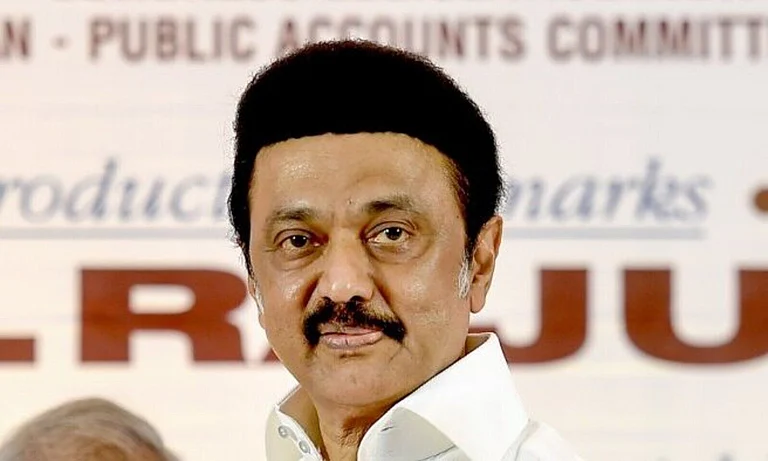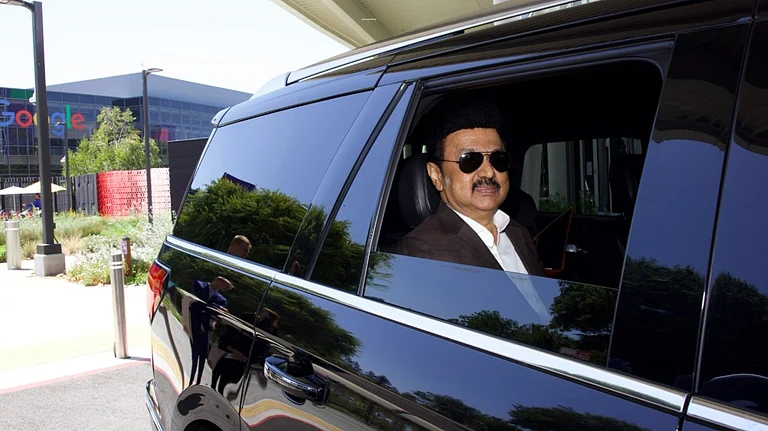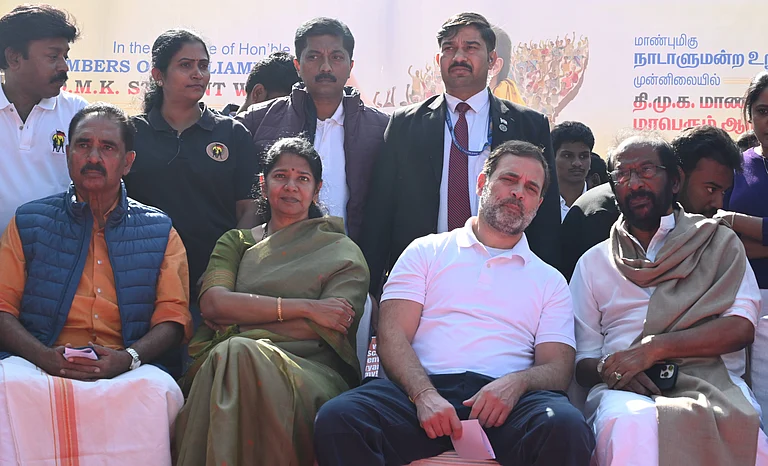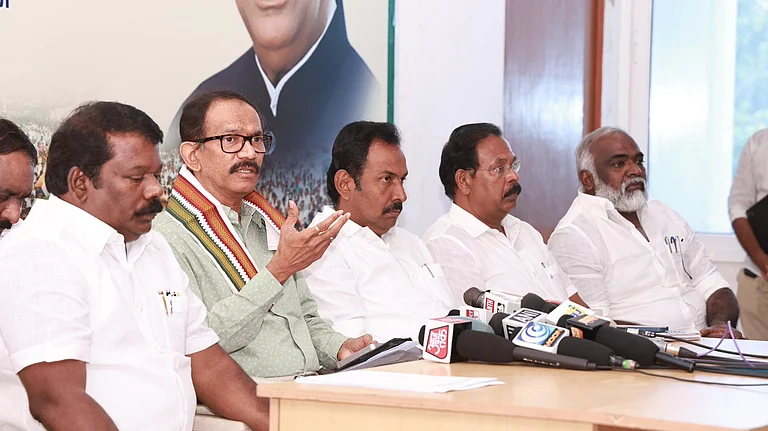The 'Star Wars' in Tamil politics is entering another historical phase with the launch of a new political party, the Tamilaga Vettri Kazhagam (TVK), by actor Joseph Vijay, affectionately called 'Thalapathy' (commander). This new political venture from Vijay, who is the second-highest celebrity taxpayer in India according to Fortune India Magazine, can be described in a nutshell as a form of 'customised Periyarism'—Vijay phrases it as "everything taken from Periyar except the denial of the existence of God".
TVK had its first public meeting at Vikravandi in Villupuram District on 27 October, during which Vijay articulated the vision of his party as one that draws inspiration from E V Ramaswamy (Periyar) and Dr. B R Ambedkar. At the heart of TVK's ideology, as highlighted by Vijay at the huge gathering, is a commitment to social justice, women empowerment, equality, and Tamil nationalism. He invoked historical figures like Velu Nachiyar and Anjalai Ammal as ideological heads to establish social justice and inclusivity at the centre of the party's ideological framework.
Emphasising the importance of Tamil values and the need for a government that serves all citizens equally, he has positioned his party as a counterforce to both the ruling DMK and the BJP, declaring DMK as a political enemy and BJP as an ideological foe. This clear delineation of adversaries suggests that TVK seeks to carve out a distinct identity in a political landscape dominated by established parties.
At the event that marked his formal entry into the political arena months after the announcement of his party in February 2024, Vijay emphasised the importance of cultural identity and regional integrity, pledging to promote Tamil as the administrative language in courts while advocating for the removal of the Governor's post in Tamil Nadu.
He criticised the DMK for masking corruption with ideological rhetoric, suggesting that he aims to expose what he perceives as hypocrisy within existing political frameworks. Without naming DMK, he referred to a "dynastic selfish family unit running an anti-people Government immersed in corruption pretending as Dravidian model."
Vijay also positioned TVK as a party that engages in politics without hate, focusing on constructive dialogue and reform rather than divisive tactics.
Vijay has indicated willingness to form alliances but has firmly stated that TVK will not be painted as a 'B team' of any other party. This assertion aims to establish TVK as an independent entity capable of challenging the status quo.
Vijay's TVK would contest all 234 seats in the upcoming 2026 Tamil Nadu Assembly elections, aiming to establish the party as a formidable force against established parties like DMK and AIADMK. During his public meeting, Vijay claimed that each vote for TVK would catalyse significant change, likening it to an ‘atom bomb’ capable of transforming the political landscape of Tamil Nadu.
Vijay's entry into politics is particularly significant given his immense popularity as a film star. Vijay enters a fiercely competitive arena dominated by established players like the DMK and AIADMK, alongside the rising influence of the BJP. His celebrity status could attract a substantial following; however, translating this popularity into electoral success remains uncertain.
The political domain of Tamil Nadu has always been a space of 'star wars' with big names from the film industry dominating the scene, beginning with C N Annadurai, and through M G Ramachandran, Karunanidhi, and Jayalalitha to the latest, Udayanidhi Stalin. No other State in India has such a quintessentially umbilical relationship between Cinema and Politics. It does not mean that the entry of a new popular film star into politics is easy. The political landscape in Tamil Nadu is highly competitive, with entrenched parties like DMK and AIADMK alongside a resurgent BJP. The success of TVK will largely depend on how effectively Vijay can mobilise his supporters and articulate a clear vision that resonates with broader electoral concerns beyond his celebrity status.
Failed Experiments
Rajinikanth, the iconic Tamil actor, announced his entry into politics on December 31, 2017, during a fan gathering in Chennai, ending months of speculation about his political ambitions. He expressed his intention to launch a political party called Rajini Makkal Mandram (RMM, Rajini People's Forum), which he claimed would contest all 234 Assembly seats in Tamil Nadu. Rajinikanth described his political philosophy as one of ‘spiritual politics,’ emphasising honesty and corruption-free governance. He stated that politicians were robbing the people of their rights and that a change was necessary from the grassroots level.
Despite his initial enthusiasm, Rajinikanth's political journey faced significant challenges. In December 2020, he shelved his plans to launch the party for the 2021 Tamil Nadu elections, citing health concerns as a decisive factor. Rajinikanth was reportedly close to the BJP and RSS. He did not embrace Dravidian politics or Tamil Nationalism much but stuck to Indian nationalism instead. This is one of the factors that led to the failure of his political entry in Tamil Nadu, according to observers.
In contrast, Makkal Needhi Manram (MNM), the political party launched by another legendary actor Kamal Haasan in February 2018, gathered some momentum in electoral politics. He positioned himself as a reformist leader, focusing on social justice, secularism, and transparency in governance. He criticised both the ruling DMK and AIADMK parties and aimed to engage with youth to drive political change in Tamil Nadu. Even before the formation of a political party, Kamal Haasan was known for his anti-Hindutva stance.
He presented MNM as a centrist party aimed at providing an alternative to the prominent Dravidian parties, DMK and AIADMK, which have dominated Tamil Nadu politics for decades. His initial electoral performance was promising; in the 2019 Lok Sabha elections, MNM garnered approximately 3.72% of the vote share, indicating a potential foothold in Tamil politics. The MNM candidates did fairly well in the urban constituencies but gathered poor response in the rural ones. However, this initial success did not translate into sustained momentum. In the 2021 Assembly elections, MNM's vote share plummeted to around 2.62%, signalling a troubling trend for the party's viability, and raising questions about its leadership and strategy.
The lack of a robust organisational structure and failure to attract prominent political figures limited MNM's growth potential. Additionally, as electoral defeats mounted, Kamal Haasan began to shift his political strategy, engaging in discussions for alliances with established parties like the DMK. Eventually, MNM ended up as yet another ally of DMK, which was formally acknowledged in the 2024 Parliament election.
Considering the failed experiments of legendary stars in Tamil Cinema, the path forward is tough for Vijay. He received accolades even in Kerala for the way he responded to a hate campaign from right-wing groups referring to his Christian identity. In 2017, H Raja, the then national secretary of BJP, tweeted 'revealing' that Vijay's full name was Joseph Vijay Chandrashekhar and that he was a Christian. What invited the wrath of the BJP leader was a dialogue in his movie Mersal criticising GST. According to H Raja, Vijay criticised GST because he was a Christian. Raja shared the image of an identity card of Vijay in which his full name was displayed with the caption that 'truth is bitter'.
Vijay, in response, started using his full name in public. While Vijay's assertive response may have enthused his fans, social media wars need not translate into votes. Vijay is yet to prove his potential as a political leader who can bring an alternative to the dominance of the two Dravidian parties and the rising influence of BJP.



























